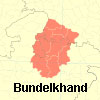(News) The battle in Bundelkhand,the war in UP by Sudha Pai
Given the political significance of Uttar Pradesh,the campaign for assembly elections due in May 2012 has started gathering strength. It was flagged off by Samajwadi Party leader Mulayam Singh Yadav with a three-day state-wide agitation in early March,when he criticised the Bahujan Samaj Party government as corrupt and incompetent,leading to violence and the arrest of many workers and leaders. Recently,the Congress party organised a parivartan rally at Banda in Bundelkhand district,addressed not only by Rahul Gandhi but also by Prime Minister Manmohan Singh.
With the decline of identity-based politics that had played a central role throughout the 1990s,all political parties in UP, including the Congress, have adopted an agenda of economic development. Two recent changes in the Hindi heartland have rendered this imperative. The Mayawati-led BSP government,on assuming power in 2007 pronounced unlike in the past when it pursued Dalit-oriented policies that its priorities were the inclusive development of all social segments and backward regions. Second,the electoral victory of Nitish Kumar in Bihar has heightened aspirations among the electorate, and sharpened the demands for development.
On earlier visits to Bundelkhand,Rahul Gandhi had focused on the problems of Dalits. At the Banda rally,he attacked the BSP government for lacking an economic vision and neglecting backward regions like Bundelkhand. The rally is part of his endeavour since the early 2000s,and more seriously,2007,when the BSP captured power,to revive the organisation and base of the Congress party in the state. This effort has assumed greater political significance after the Congress obtained 21 seats in the 2009 national elections,the poor performance of the SP and the continued decline of the BJP,which has brought the Congress into direct confrontation with the ruling BSP.
According to a report by the Giri Institute of Development,Lucknow,Bundelkhand is not the most backward region of UP it has shown remarkable progress since the early 1990s in reducing poverty,and recorded relatively satisfactory growth. Rather,the region was selected by Gandhi because it has 21 assembly and four Lok Sabha seats,and is a former Congress bastion,which it hopes to recapture from the BSP. Beginning his 2009 election campaign from here,Gandhi had demanded the establishment of a Bundelkhand Autonomous Authority,a financial package for large-scale irrigation,the trifurcation of UP and the establishment of a separate state of Bundelkhand to upstage this demand by the BSP. Taking this forward at the Banda rally,Gandhi argued that Bundelkhand had progressed when the Congress ruled the state and even now, it was the Central government that was attentive to the needs of its people,while the state government had failed to implement the development package provided by the former in 2009. This,he promised,would change once the Congress returned to power. The PM,on his first visit to the region,announced a slew of projects: rural drinking water,an agriculture university in Jhansi,a super-thermal power plant at Bargarh,upgrading the government medical college at Jhansi and setting up of five more Central schools and a development package that could be split between Uttar Pradesh and Madhya Pradesh to overcome water shortage and improve agricultural potential.
Read More..
Courtesy : The Indian Express
- Anonymous's blog
- Log in to post comments
